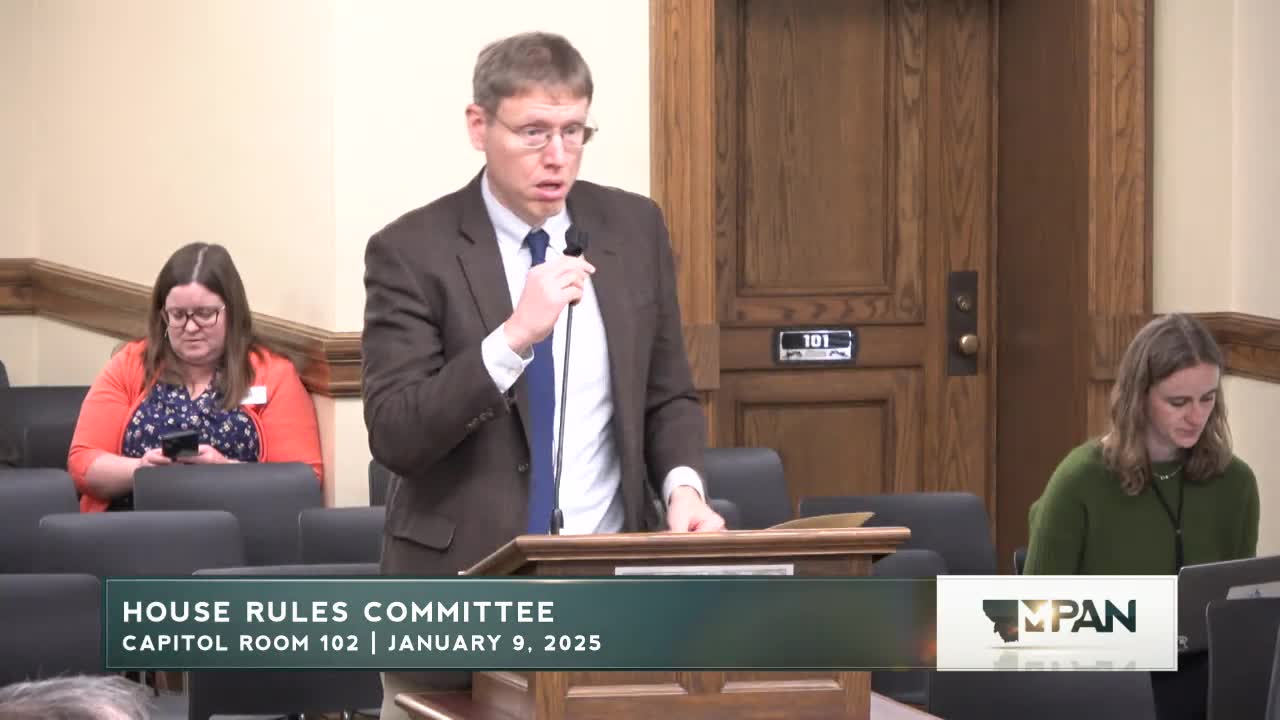Montana House Rules Committee debates HR 1 decorum amendment, delays action
Get AI-powered insights, summaries, and transcripts
Subscribe
Summary
The House Rules Committee discussed HR 1, a package of proposed changes to floor decorum and intern workplace rules, including a contested graduated discipline system and a request to limit retroactive complaints; the committee postponed executive action until tomorrow at noon to revise language.
The Montana House Rules Committee debated HR 1, a proposed update to House floor decorum and related rules, and postponed action until it reconvenes tomorrow at noon so sponsors can revise amendment language.
The measure under discussion, presented by Representative Steve Fitzpatrick (R., House District 24), would add a written code of conduct to House rules and create a graduated discipline process for breaches of decorum. Fitzpatrick said the amendment seeks to “establish... things that would not be... in decorum,” including imputing motives, using profane language, or threatening injury to a member.
Why it matters: The proposal would codify specific sanctions for out-of-order conduct — a warning for a first offense, loss of recognition for up to three days for a second offense, and expulsion from the floor for up to six days for third and subsequent offenses — and it would give the presiding officer and, ultimately, the House the power to impose penalties. Lawmakers on both sides said those enforcement measures raise questions about due process, the scope of the speaker’s discretion, and potential impacts on representation.
Committee discussion focused on several contested points. Representative Sullivan asked about retroactivity, saying, “My first question is about retroactivity. In the bill, I currently do not see anything that requires this to happen within the day and time of the supposed offense.” Fitzpatrick acknowledged the provision needed editing and said the sponsors intended a short window for raising complaints — limited to one business or legislative day — and that language would be fixed before further action.
Several members raised constitutional and representation concerns. Representative Reeves warned the measure could circumvent the Montana Constitution’s two-thirds removal requirement by enabling removal by a simple majority in practice, saying it “functionally allows removal of representatives on a on a majority vote.” Representative Carlin and others objected to a provision that states the House may take additional measures, “including expulsion regardless of the number of prior offenses,” arguing that language could bypass the graduated discipline the amendment otherwise establishes.
Other members questioned fairness and unintended consequences. Representative Vowell said she was “worried that we are holding members responsible for the actions of the public in the chamber,” noting that audience reactions such as cheering or booing could be used to justify discipline. Representative Dan expressed concern that extended suspensions could effectively disenfranchise tens of thousands of voters in an affected district, noting that while suspended members might still be allowed to vote, they would lose the ability to speak for constituents on the floor.
Supporters and critics proposed alternatives. Representative Carlin offered a competing draft (amendment 1.1.4) that would define decorum as conduct “required to conduct business, debate questions, and make decisions effectively without dilatory or distracting actions,” and which emphasizes protecting members’ ability to speak for constituents while prohibiting profanity, impugning motives, and procedural violations. Fitzpatrick and others said a compromise amendment is being drafted and that portions of the current draft need editing for clarity and to limit the time window for raising decorum complaints.
A second amendment under discussion would set rules for legislative interns’ workplace locations and lobbying prohibitions. Fitzpatrick described an amendment, requested by the Speaker’s office, that would restrict interns’ presence in certain rooms; Representative Carlin said her office was comfortable removing Room 64 (the majority bullpen) from the list but still sought limits on other spaces (Room 10 was discussed). That amendment, too, requires editorial changes, committee members said.
There was no public testimony on HR 1 during the hearing, and the committee did not take a formal vote on any amendment. Representative Fitzpatrick concluded that sponsors will revise the language and the committee will reconvene for executive action the next day. “What I think we’ll do is, why don’t we just come back tomorrow and do executive action? ... we’ll be adjourned until tomorrow at noon,” he said.
The committee’s next steps are to incorporate fixes to retroactivity language, clarify the scope of permissible penalties, and consider the compromise amendment offered by Representative Carlin before taking formal action.
